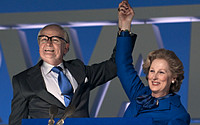
scr Abi Morgan; prd Damian Jones
with Meryl Streep, Jim Broadbent, Olivia Colman, Alexandra Roach, Harry Lloyd, Anthony Head, Richard E Grant, Nicholas Farrell, Roger Allam, Julian Wadham, Phoebe Waller-Bridge, Susan Brown
release US 30.Dec.11, UK 6.Jan.12
11/UK Pathe 1h45

The winner takes it all: Broadbent and Streep



 A fairly straightforward character portrait without any real analysis or message, this biopic succeeds because of the translucent performance by Meryl Streep. While the script and direction are inventive, they're also oddly uncritical.
A fairly straightforward character portrait without any real analysis or message, this biopic succeeds because of the translucent performance by Meryl Streep. While the script and direction are inventive, they're also oddly uncritical.
In present-day London, Baroness Thatcher (Streep) is battling delusions of her dead husband Denis (Broadbent), who triggers memories of her life in politics. Growing up during the war, young Margaret (Roach) becomes increasingly involved in politics, catches the eye of young Denis (Lloyd) and moves up the ladder from MP to become Britain's first female Prime Minister. She was also the longest-serving PM in the 20th century, staunchly sticking to her guns through the Poll Tax strikes, Falklands War and privatisation of much of the British state.
Since the events are seen completely through Thatcher's eyes, the film never takes an antagonistic stand, so it sometimes feels like a portrait of St Margaret, with her pragmatic approach to the economy and resilient confidence. But careful observation reveals just how disruptive she was to the UK economy, favouring the wealthy with her policies and using heavy-handed tactics against anyone she thought of as weak, from striking miners to the Argentine military.
Intriguingly, the film rarely lets Thatcher show any self-doubt, although Streep finds powerful ways of expressing the woman's soul in every scene, whether it's through a smiling glint or a welling tear. These things aren't necessarily affirming Thatcher's actions, although they seem to explain them to a degree. But Streep goes far beyond being a mimic in the role: the dialog (and that iconic voice) seem to flow naturally from within her, as does the firm resolution and unmovable belief that she's always right. Far right.
The cast around her is excellent. While Broadbent's role is a bit goofy and dreamlike, Colman is beautifully grounded as their daughter Carol. And the parade of famous political faces gives most actors the chance to transcend the Spitting Image-style make-up and hair. Speaking of which, even with the instantly recognisable hair, costumes and mannerisms, Streep is startlingly realistic as both the energetic young politician and the doddering old dame. And maybe that's why this film needed to be made: to give Streep another character to master from the inside out.
 |
themes, some violence | 24.Nov.11 |

 Still waiting for your comments ... don't be shy.
Still waiting for your comments ... don't be shy.
HOME | REVIEWS | NEWS | FESTIVAL | AWARDS | Q&A | ABOUT | TALKBACK